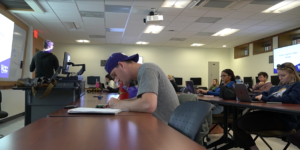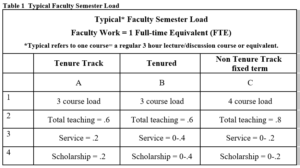“Imagine that based upon your expertise in your field you have been recruited to teach on the faculty of a prestigious university. Imagine that after nine years’ service you have gained superior evaluations from your department head, excellent evaluations from your students, been awarded grants for study abroad, and are the author of a best-selling work. But during these nine years of faithful service, you have seen everyone on campus from the chancellor to the grass cutters get a pay raise every year. You have seen tuition double and major construction projects completed, yet your salary has remained the same without so much as a cost-of-living increase.”
WCU Faculty Forum vol.10 – no.3, by Michael Waters, visiting instructor of music, 1997.
This is a reality that has stayed consistent for part-time faculty members at WCU, but changes are on the way.

Beginning summer of 2024 WCU adjuncts will see a 30 to 33% pay increase in their contracts. Adjuncts with a master’s degree will receive $1,200 per class-hour and adjuncts with terminal degrees will receive $1,300 per class-hour. Previously, compensation was $900 for master’s and $1,000 for terminal degrees.
It is unclear how long adjunct compensation has remained the same, but numerous sources confirm it has not changed in over 15 years.
WCU Provost Richard Starnes began his career in higher education as an adjunct professor. He believes the changes are necessary for the continued success of the position.
“I think [the compensation increase] better recognizes the work and contributions that they make to the overall effort,” Starnes said.
Part-time in higher education
Adjunct faculty are recognized as part-time professors, typically contracted each semester to work at their respective universities. These faculty members often work multiple jobs at different universities or maintain work in a professional setting.

As part-time employees, adjuncts often fill in introductory-level classes to provide support for programs. In some cases, faculty use their positions as adjuncts to support their full-time passions of teaching in higher education.
Not all adjuncts work the position as their only source of income. Many adjuncts, especially those in health fields, continue their professional careers while working part time as instructors. Those that choose to pursue a full-time job as an adjunct face numerous challenges including low pay, little job security, and no benefits.
Haylee Wilkie is a former adjunct professor who taught during the 2022-2023 academic year. During that year she was employed at WCU, Haywood Community College and worked for a non-profit. For Wilkie, being an adjunct was the first steppingstone to a job in higher education, though working three jobs was a challenge.
“Being an adjunct is very hard,” Wilkie said, “the workload was quite aggressive and inconsistent.”
Wilkie said every week presented new challenges and schedule changes. With these challenges, she found it difficult to hold multiple positions.
Today, Wilkie works as the Associate Director of the WCU Writing and Learning Commons as a full-time staff member.
“I did not choose to renew any kind of adjunct contracts because it was not feasible for me to continue with that lifestyle. It was just not sustainable for me,” Wilkie said.
Wilkie is not alone in this thinking.
In 2022 the American Federation of Teachers conducted a “quality of life” survey in which they received over 1000 respondents from part-time faculty across the nation.
The survey details that 27.6% of the respondents made less than $26,500 per year.
Adjunct faculty in Western North Carolina
While the pay changes at WCU have made adjunct wages better, working as a full-time adjunct in Western North Carolina is still a challenge for some.
According to the MIT Living Wage Calculator, the required annual income before taxes for a single household Jackson County resident is $39,788.
This number would be attainable for an adjunct with a PhD teaching five classes each semester, but WCU, like other universities across the nation, has a cap on how many classes adjuncts can teach. The cap at WCU currently sits at three with the possibility of a fourth class if given approval.
This leaves a WCU adjunct with a master’s degree to teach four classes each semester for a yearly total of $28,800, after the increase in pay. Still, adjuncts have no options for retirement plans or health insurance.

As is typical for adjuncts using the position as their only job, many work at other local institutions, just like Wilkie.
All three local community colleges – Southwestern, Haywood and A-B Tech – pay adjuncts with master’s degrees $1,670.40 per 3-hour course, the state mandated amount.
An adjunct with a master’s degree teaching four classes at WCU and one at a local community college would receive $32,140.80. An adjunct working the same load with a PhD would make $34,770.24. Parking on campus would also take some of this compensation if the faculty member taught in-person classes.
Frau Mingus is an adjunct professor at WCU in the world languages department and is director of the German minor program. She has worked at WCU as an adjunct for nine years.
During a normal semester, Mingus teaches five to six classes between WCU and Southwestern Community College. One semester she taught at WCU, Southwestern and UNC Asheville simultaneously.
“I’ve heard some criticism…I heard someone at another school say, ‘you know, these adjuncts don’t come to the meetings, and they’re not involved,’ and I was thinking to myself, well, that’s because they’re working elsewhere, and they’re trying to pay their bills, they’re trying to pay the rent, buy the groceries,” Mingus said.
Adjuncts also face low levels of job security. The prospect of class cancellations and not having their contracts renewed is a reoccurring fear.
“I have concerns every semester,” Mingus said.
Even with this adversity, Mingus appreciates her job and continues to make necessary time for her students.
“I just do the best that I can and try to focus on the students and make sure that they are getting the materials and the time and the attention that they need,” she said.
Many students, including her own, do not realize some of their professors are considered part-time workers.
What the changes mean for WCU
Talks to increase adjunct pay began in 2019 when Starnes became Provost.
In 2022 the UNC System made changes to its funding model, leaving WCU with budgetary flexibility. The increase in adjunct pay is a direct result.
“We were in a place where we could make some of those decisions this spring,” Starnes said.

A significant amount of funding for adjuncts is paid on “one-time dollars,” funds that the university receives on a reoccurring basis, that are unallocated.
Starnes’ goal is to reduce the university’s reliance on one-time dollars, but as he told The Western Carolinian, these changes will not impact how many adjuncts WCU will employ.
“I wouldn’t make a decision like this unless I was comfortable that it would be funded well into the out years and would be a sustainable model moving forward,” Starnes said.
According to WCU’s human resources, the university currently employs 396 tenure track faculty, 253 fixed term faculty and 137 adjunct faculty.






